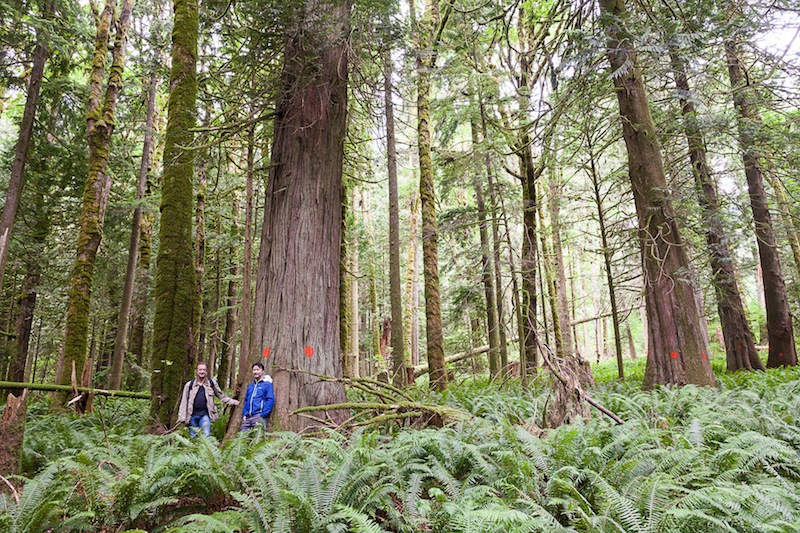
Please SEND A MESSAGE to Protect Echo Lake Ancient Forest! www.ProtectEchoLake.com
Hi friends, please take 1 MINUTE to send a new message to the BC government to protect the imminently endangered old-growth redcedars at Echo Lake – some of which are 12 feet wide! Echo Lake is an extremely rare, lowland old-growth forest about 2 hours east of Vancouver between Mission and Agassiz, in Sts’ailes First Nation territory. The area is home to numerous species at risk, is part of the drinking watershed for local people, and is also the world’s largest night-roosting site for bald eagles, with 700+ eagles seen roosting in the old-growth trees around the lake on some evenings during the fall salmon run. The construction of a new logging road is imminent, while initial surveying of the giant cedars for logging has already begun. See the recent media release at https://ancientforestalliance.org/news-item.php?ID=1023 and SEND A MESSAGE to protect this unique area at www.ProtectEchoLake.com
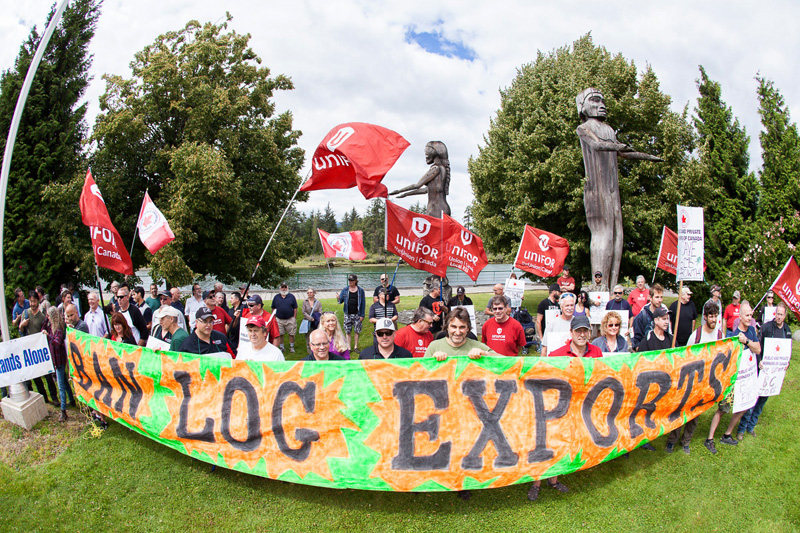
Photo Gallery: Timber Workers/ Environmentalists Rally in Port Alberni
On Friday, July 22, forestry workers from various sawmills and pulpmills from two major unions, the PPWC (Pulp, Paper, and Woodworkers of Canada) and Unifor, were joined by community members, politicians,first nations, and environmentalists in Port Alberni in a rally for sustainable forest policy in BC.
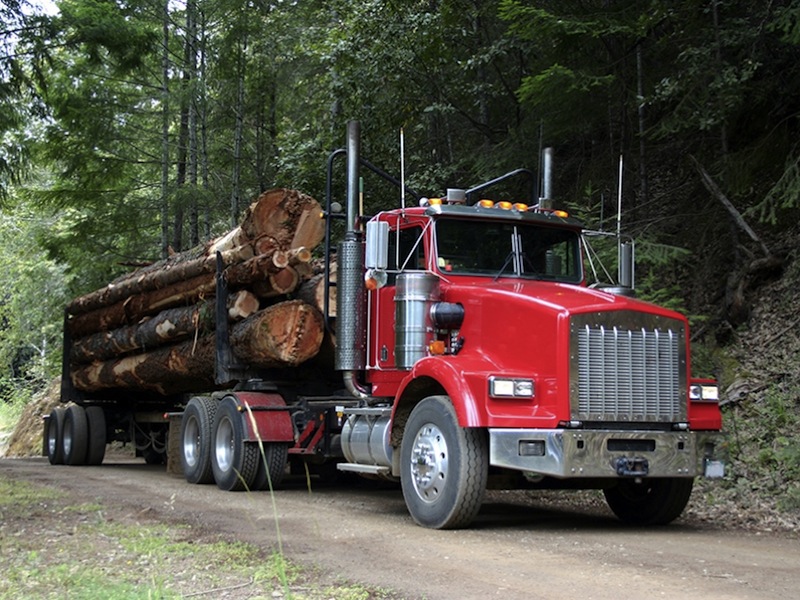
Forest industry in danger, say BC mayors
Here's a Powell River Peak article on the state of the forest industry:
"While he said he has sympathy for the small operators and contractors, the blame for the current situation rests on the shortsightedness of an industry that has depleted old-growth forests and has not reinvested in mill infrastructure to handle second-growth wood, said Wu.
According to Wu, even the provincial business lobby and local governments around the region have supported the idea of protecting what is left of BC’s old growth.
“What we need to do is do more with less, and focus on the second growth,” said Wu.
He added that instead of trying to market BC old growth and raw logs in China, the industry needs to find markets for value-added, sustainable, second-growth products.
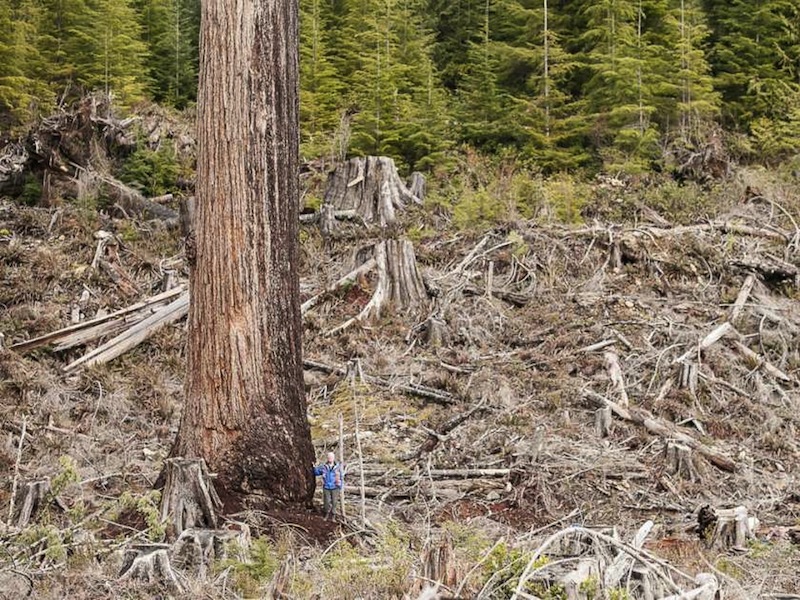
Sierra Club calls for a moratorium on old growth logging
Here's a Vancouver Sun article by Stephen Hume also based on the new Sierra Club mapping on how much old-growth remains:
Forest scientists like Jim Pojar say this forest should be considered the remnant of a dwindling non-renewable resource because the life cycle of these forests is so long that it will take 40 to 50 human generations before they recover to their original state.
Even then, he says, they won’t be anything like the forests that exist today, nor will the communities of plants, insects, birds and animals — about 400 species — that rely upon them.
Meanwhile, the Sierra Club study points out, even as the remaining rainforest vanishes under the chainsaw, the rate at which it’s being cut has increased by 12 per cent. And, it says, re-planted forests that won’t mature for another 250 years are already being logged after only 50 or 80 years as immature second and third growth.
Pojar, a forest ecologist who wrote the well-regarded guide, Plants of Coastal British Columbia, was an ecologist and researcher with the B.C. Forest Service for years. He recently authored a major study for the Canadian Parks and Wilderness Society on climate change and its implications for biodiversity and conservation policy.
“Given the amount and pace of climate change, all B.C. forest stands older than 150 years are non-renewable resources, and some of them should be removed from the timber harvesting land base,” says Pojar. “If logged they will not be replaced either naturally or artificially by mature and old stands with similar structure and function, even if they are allowed to grow old.
“Even if allowed to grow old they will not recover to the primary condition,” he says, “which is why I maintain that recovery of old growth forest is now an inappropriate, anachronistic concept, given rapid climate change, system unpredictability and scientific uncertainty.”
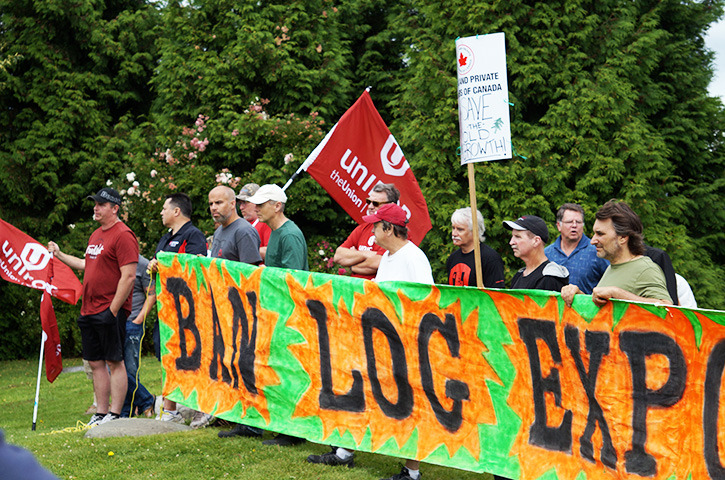
Environmentalists rally for forests and jobs in Alberni
Representatives from major forest industry unions and environmental organizations along with local elected officials and First Nations marched today, July 22, in Port Alberni to rally for sustainable forestry.
The Public and Private Workers of Canada (PPWC), Unifor, Wilderness Committee and Ancient Forest Alliance are calling on the BC government to end raw-log exports and to prioritize the transition to sustainable second-growth forestry
Scott Fraser, MLA for Alberni-Pacific Rim, as well as local First Nations representatives spoke at the rally at Victoria Quay.
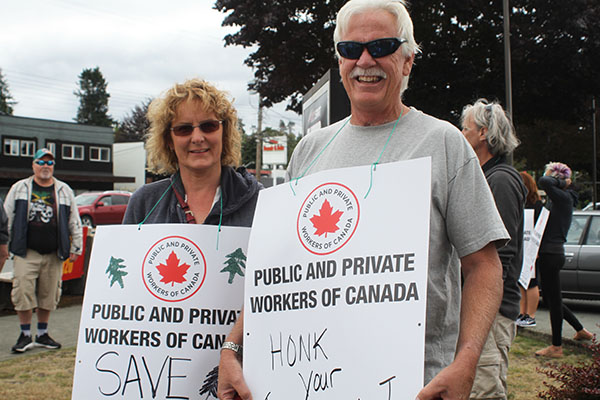
Protesting Raw Log Exports
Here's a news article on Friday's rally in Port Alberni:
A collaboration of forestry workers and environmentalists took to the streets today in an effort to fight back against provincial raw log exports. Organized by the Public and Private Workers of Canada (PPWC) and the Ancient Forest Alliance, the rally attracted a number of supporters both for the walk up Johnston Road and by honks from those driving by.
Organizers hope the rally keeps the momentum going since the last one in Duncan a few months ago.
“We want to bring attention to the government,” said PPWC president Arnie Bercov. “They are exporting 60 per cent of second growth logs and exporting the future of young people.”
Bercov said Port Alberni is the epicenter of the industry, was built on forestry and is now threatened because of mismanagement.
Vince Lukacs, national representative with Unifor 592, agrees.
“We are exporting six to seven million cubic metres of wood fibre a year to foreign mills,” Lukacs said. “That is enough to run several mills. There has been a significant reduction in the number of mills operating in BC and this province was built on the forest industry. We’re exporting instead of doing it ourselves.”
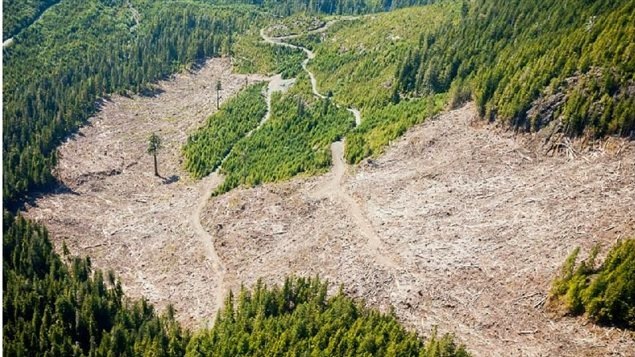
Ecological emergency: call to save remaining West Coast old growth forest
Here's a good article in Radio Canada with lots of the AFA's photos (by TJ Watt) based on the Sierra Club's recent mapping on how little old-growth remains on Vancouver Island:
Richard Hebda, the Royal B.C. Museum’s curator of botany and earth history says the old forests weave together a complex interconnected system of hydrology, soil formation, nutrient cycling and so on.
Logging removes not only the trees, but also breaks up the living fabric holding those systems together.
Quoted in the Globe and Mail news, he says, ““We need a hard-nosed investigation of what we want these forests to be doing: Do we want to protect biodiversity? Do we want them to be very good at storing carbon? Then we can decide how much forest we actually need”. He adds, “I think the answer will be a much higher percentage than we now have.”
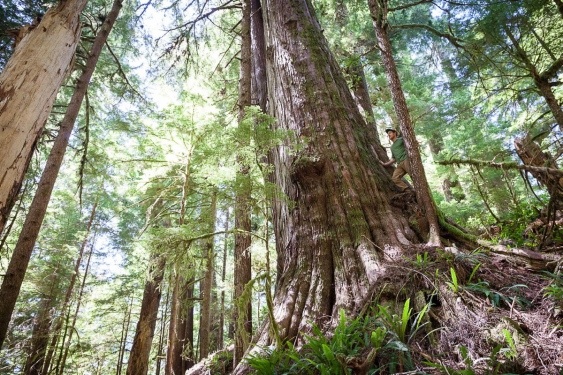
‘Generational amnesia’ softens fight for forests
Jack Knox in the Times Colonist: The future of the forests was once seen as being inextricably linked with the identity, economy and culture of the Island, and the resulting tugs-of-war were big news, not just here but abroad. In 1993, the legendary War in the Woods, the massive campaign against Clayoquot Sound logging, drew international attention as 850 protesters were charged. Activist rockers Midnight Oil —whose big, bald singer, Peter Garrett, later became Australia’s environment minister — played a concert at the protesters’ camp. Environmental lawyer Robert Kennedy, Jr. (another kind of rock star) waded into the fray. International pressure, the threat of boycott, eventually contributed to B.C. forestry reform.
It would be wrong to drag out some “if a tree falls in the forest” metaphor and say nobody cares about this stuff anymore. They do — and in the mainstream, too. In May the B.C. Chamber of Commerce, hardly a bastion of hemp-hatted hippies, called on the province to expand protection of old-growth forests in areas where they have, or are likely to have, greater economic value if left standing.
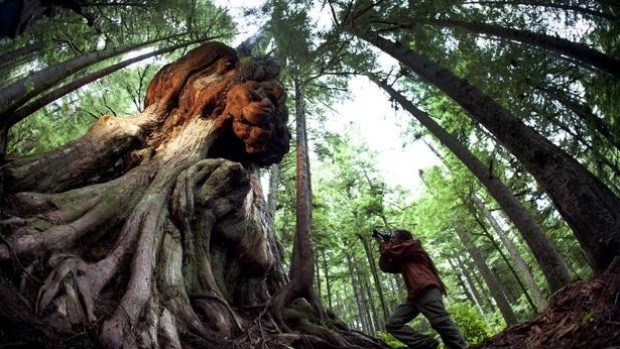
Vancouver Island old growth on brink of collapse, environmental group claims
This spring, the Port Renfrew Chamber of Commerce pitched a bold policy to the 36,000 businesses that make up the B.C. Chamber of Commerce (BCCC). Its bottom line: old growth forests have greater economic value as a tourism attraction than as logs. "We raised the flag and said, 'Hey, it makes more sense to bring the tourists in than to take the logs out,'" said Hagar. The policy was overwhelmingly supported by members of the BCCC, and this week, management will individually write each of the B.C.'s ministries outlining their new policies.
About five years ago, the Ancient Forest Alliance successfully lobbied the B.C. government to protect Avatar Grove, a cluster of 80 metre-tall old growth Douglas fir and western red cedar thought to have sprung up 800 years ago.... That's when Hagar really started to notice some changes. 'People love history and people love this idea of environmental tourism,' he said. 'Old growth, big trees are good for business.'
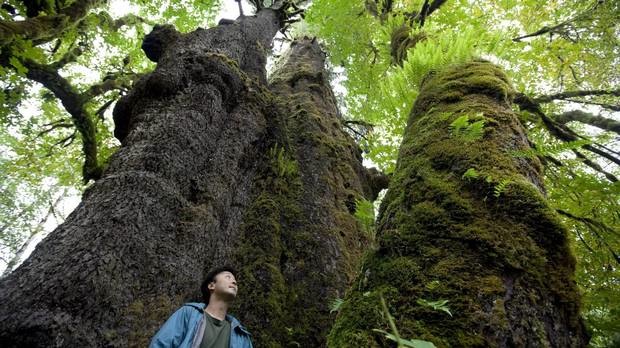
The fight to save Echo Lake’s old trees and wildlife has begun
Here's a new story in today's Globe and Mail about the old-growth forest campaign, spearheaded by local landowners Susan and Stephen Ben-Oliel and supported by the Ancient Forest Alliance, to protect all of the forests in the mountains surrounding Echo Lake (a rare lowland old-growth forest between Mission and Agassiz in Sts'ailes territory, and also the world's largest night-roosting site for bald eagles) from logging:
“Echo Lake is home to the largest night-roosting site for bald eagles on Earth,” said Mr. Wu, who in 2012 launched a campaign to save the area, then slated for logging.
In 2013, the British Columbia government set aside 55 hectares, protecting just over half the old-growth cedars and Douglas firs around the lake.
Mr. Wu wasn’t satisfied and since then has been pushing for the addition of another 40 to 60 hectares to the reserve, which would protect the key eagle area. “That would get the bowl, essentially the mountain and forest that rings Echo Lake. So it should be a no-brainer at this point,” he said.

